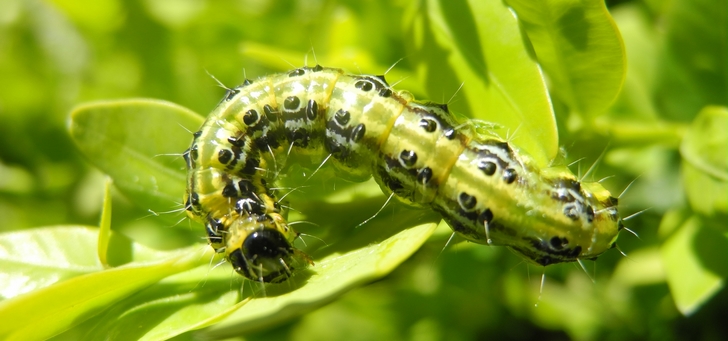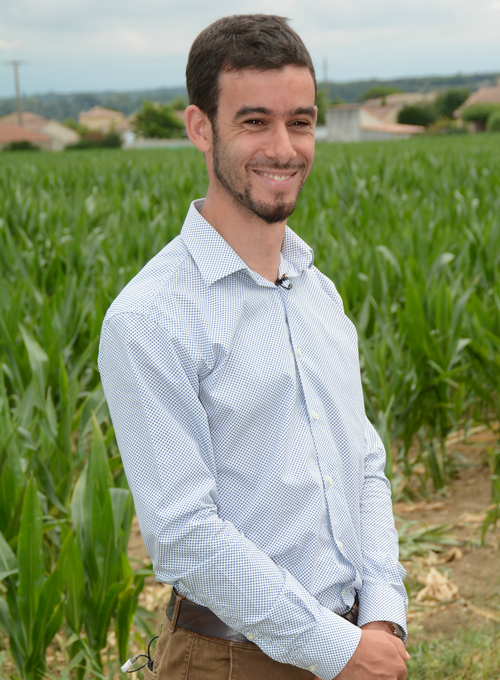The fight against invasive species must be collective… and sustainable!
To understand how to fight invasive species without chemical products, we interviewed Bioline Agroscience, winner of a Paysalia Innovations Trophy in 2017!

Many professional landscapers are confronted with invasive species that destroy their work and are looking for solutions. To understand how to fight them effectively, we interviewed Bioline Agroscience marketing manager Sébastien Rousselle. This company was awarded a Paysalia Innovations Trophy in 2017 for its ecological innovation that eradicates box tree moths.

Paysalia: Professional landscapers are fighting invasive species on a daily basis. Why these species appear suddenly in a territory?
Sébastien Rousselle: Invasive species generally arrive in countries like France to follow their food, which has become more abundant in recent years, or due to changes in climatic conditions which favorize their expansion here and made them quit their traditional habitats.
When they are brought here by mankind, this is generally due to the importation of materials or plants and often because of a lack of vigilance.
Which invasive species cause the most problems today?
The list is long! The pine processionary has been around for many years and the horse-chestnut leaf miner which attacks the leaves causing early defoliation, and, of course, the box tree moth.
This one arrived from Asia in the early 2000s and has adapted very well to our climate. It arrived in a territory without any real predators as French animals and insects do not recognize this ravager as a food. But things are changing. Some birds are beginning to feed their young with their larvae. However, it has a colossal reproduction capacity — several cycles a year, with several hundred eggs per cycle! How to treat box tree moths effectively is a real problem for professional landscapers in France and other European countries like Switzerland and Germany where box trees are very common.
What are the other main impacts of invasive species over and above the destruction of plants?
From a biodiversity point of view, one threat is the potential disappearance of plant species. In some areas, box tree moths can kill all the box trees in just a few years. There is also an impact on the biotope, as fauna and flora will have to adapt to this new presence. For example, some animals will lose their natural habitat and will have to adapt by finding a new place to live.
Concerning impacts on mankind, there are allergenic risks from some species, like the pine processionnary or the Asian hornet. Less serious but just as disturbing, some species can make life outdoors impossible — for example when box tree moths decide to invade the terraces of houses or restaurants in the evening.
Last but not least, in terms of landscapes, they can totally destroy the work of landscape designers when their impact is not limited to making plants unsightly. Consequently, this implies in-depth re-examination of the installation of a park and replacing one species of plant by another or spending more time on green space maintenance. This requires a lot of resources!
What can professional landscapers do to fight invasive species? Are there solutions?
When an invasive species arrives in a territory due to mankind, it is because inspections were badly carried out. For example, Paysandisia archon, a butterfly that eats palm trees, and the palm weevil were introduced gradually in infested palm trees and now have devastating effects around the northern Mediterranean coast.
The best solution to fight invasive species is to apply rigorous disease control. It is essential to check that plants imported or even bought locally have undergone the necessary plant health controls and are not infected. The fight against these invasive species will only be won by everyone taking care individually and collectively, particularly as the ravagers know no borders. Failure to check plants in one territory will impact all the neighboring territories. Special attention during the maintenance of green spaces is obviously vital!
Here are some ideas to avoid plant health products in green spaces maintenance
You won a Paysalia Innovations Trophy in 2017 for your durable solution against an invasive species: the box tree moth. How does this innovation work?
Our innovation, Tricholine Buxus, attacks box tree moth eggs directly. We use trichogrammae, insects naturally present in France, which kill the box tree moth eggs before they hatch by laying their own egg in the bee moth eggs. From each trichogramma egg hatches a trichogramma larva which will devour the box tree moth egg from the inside. This intervention occurs before the first damage is caused. Our method is preventive and not curative.
Our solution for this invasive species is environment-friendly and continues the first ecological treatments which appeared in 1970 to fight the European corn borer. These alternative solutions are not new, but have recently become more visible. The French Government encourages this kind of solution, some conventional products have disappeared and consumers prefer ecological treatments when treating invasive species like box tree moth. Internet facilitates access to information about these alternatives.
Discover Bioline Agroscience's interview from Paysalia 2017!
How was your innovation perceived at Paysalia 2017 when you won the trophy and how did it impact your business?
Everyone was waiting for this innovation. Professional landscapers were powerless as existing solutions were only partially effective on invasive species and only act when the damage is already visible, or require much more intensive maintenance. Several landscape designers were interested as well as managers of public or private green spaces.
For us it was an ideal opportunity to communicate in a positive and proactive way about how to treat the box tree moth, and the trophy facilitated the deployment of our innovation. The fact of being recognized by a jury helped us build credibility!
Paysalia Innovation Trophies 2017: the 6 award winners!

Our thanks to Sébastien Rousselle from Bioline Agroscience for his time and expertise.
© Photo credit: Bioline Agrosciences

